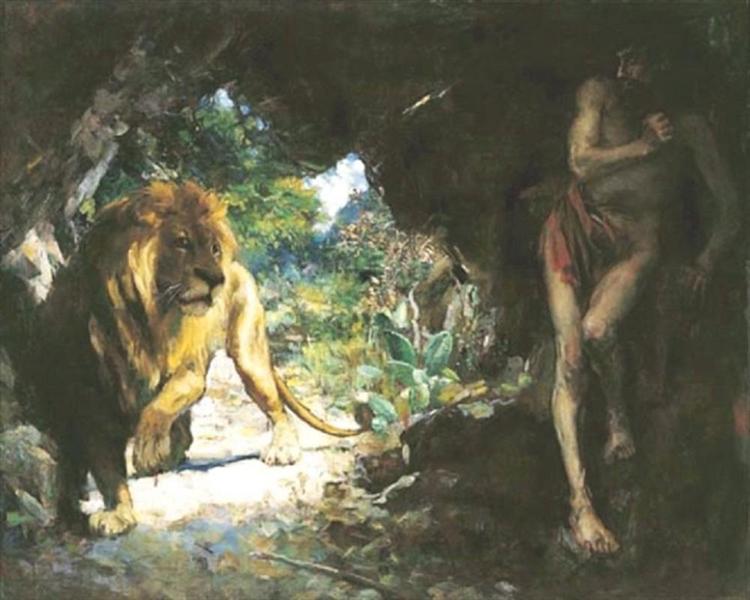Description
The painting "Slave and León" of 1924, created by the renowned Chinese artist Xu Beihong, is erected as a masterpiece that intertes aspects of the eastern and western artistic tradition. Xu Beihong, known for his skills in painting and calligraphy, demonstrates in this work a strong influence of Western realism, a movement that embraced during his formation in Europe. The painting captures attention for its powerful visual narrative and its meticulous technique.
From a compositional perspective, "Slave and León" is characterized by dynamic interaction between the two central figures: a slave and a lion. The slave, half naked and muscular, seems to be in a submission posture, while the lion, with its imposing presence and detail worked, is placed in a dominant position. Palpable tension between both characters generates a drama that encourages reflection on issues of power, freedom and instinct.
Xu Beihong uses a moderate but effective color palette. Earth's tones predominate in the slave's body and the lion's fur, contrasting with the darkest background that suggests a nebulous and perhaps intimidating environment. This color use not only enhances the central figure, but also adds depth and realism to the scene. The precision in the anatomical details of the slave and the lion demonstrates the domain of Xu Beihong in the realistic representation, highlighting his technical skill and his thorough observation of nature and the human being.
As for the historical context, Xu Beihong produced this work at an era where China was in the midst of significant social and political changes. After having studied at the Academy of Fine Arts in Paris, Xu Beihong turned a bridge between the East and West, carrying artistic influences from one world to another. "Slave and Leon" can be interpreted as an allegory of the internal and external struggle of man against superior forces, whether of natural or social origin.
The careful disposition of the elements and the expert management of the clear-dark reflect the balance that the artist achieves between light and shadow, perhaps symbolizing the duality of domination and submission. It is remarkable how Xu Beihong uses these elements to not only capture a static moment, but to tell a deeper story about resistance, strength and the inevitable struggle for freedom.
In summary, "Slave and León" is not only a sample of Xu Beihong's artistic talent, but also a testimony of his ability to merge different artistic and philosophical currents. The painting invites the viewer to participate in a complex dance of emotions and reflections, thus consolidating Xu Beihong as one of the greatest Chinese artists of the twentieth century.
KUADROS ©, a famous paint on your wall.
Hand-made oil painting reproductions, with the quality of professional artists and the distinctive seal of KUADROS ©.
Art reproduction service with satisfaction guarantee. If you are not completely satisfied with the replica of your painting, we refund your money 100%.

